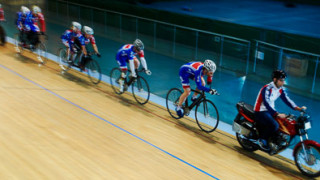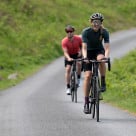![]() Published: 21 May 2012
Published: 21 May 2012
Report: Scott Hobro
British Cycling coach Tom Stanton foresees a much more challenging Paralympic Games in London for the Great Britain para-cyclists who dominated in Beijing.
Seventeen gold and three silver medals back in 2008 propelled Great Britain to the top of the medal table in cycling by some distance, with second-place USA managing five gold medals. Since that success, however, other nations have recognised the potential benefits of investing more into the sport, resulting in a much more competitive field and a mounting test for Great Britain’s athletes ahead of August.
Stanton, who joined British Cycling in 2010, recognises that matching the haul in Beijing will be difficult but is pleased with preparations so far - although he admitted predicting any sort of medal tally is problematic.
“What I have certainly seen in the last 24 to 30 months is an increase in how much other nations have ploughed into it, how much more they are taking it seriously,” Stanton said.
“Consequently it is moving on, and quickly. Within para-cycling the percentage differences are much greater than in able-bodied cycling, you can make a huge difference in a relatively short space of time by applying some of the basic sport science and engineering concepts which able-bodied cycling already does. We have always done it, so we’ve always been the best.
“As the other nations are slowly doing that as well it is becoming a much more level playing field which is great, as it means everyone has to move on and also it is more challenging as it means we have to up our game again. It is an exciting time.”
The opposition isn’t the only change since Beijing. Great Britain has been developing new talent - including the likes of Neil Fachie, Crystal Lane and current world champion Mark Colbourne - adding to the capable pool that already existed. Furthermore, there is an acceptance that as the quality continues to rise, riders will need to become more specialised in their events, a case in point with Rik Waddon.
|
"In terms of the medal haul, it’s a really difficult one. As a coaching team we feel confident we’re on the right trajectory, in terms of how that translates to medals we hope to return a significant number." Tom Stanton |
||
“We’ve done what we always said we’d do which is that we’ve identified new talent and we’ve progressed the highly talented athletes we’ve already got,” Stanton said. “In terms of the medal haul, it’s a really difficult one. As a coaching team we feel confident we’re on the right trajectory, in terms of how that translates to medals we hope to return a significant number.
“We are having to be more specific [when pairing riders with events]. At the moment we are working purely with Rik Waddon as a man one, man two for the team sprint as primary focus which we have never really done before. It’s always been that team sprint would be your secondary focus and you’d be focusing on kilo and pursuit.
"But we’re finding now that with the fantastic time the Chinese put down at the Worlds in Los Angeles, we are having to go to the next level and saying ‘right, if we have someone we know can do a job for us there and back up in the kilo as well that is where we need to get to’. I think it’s inevitable that as the world moves on you have to be more specific because things get faster and you can’t always tailor the body to all the things you are trying to do.”
Away from the personnel, both within and outside GB, Stanton admits that the team would ‘be fools’ not to recognise that a home Games is completely different to anything else that the riders have experienced before. From 30 August - 8 September, regardless of their past exploits in leading world events, Britain’s para-cyclists will all be on a level playing-field entering London and will naturally react differently to the external factors in play.
“Already the social and media interest is far greater and so we have started to broach it,” Stanton explained. “We have done a number of workshops and also on a personal level it is good as a coach to start to understand how each athlete is going to operate in those conditions.
“I know for instance that some of them will lock themselves away, I also know that other will thrive with that media exposure as it gives them a reason to perform. Each one is different, there is no one size fits all in terms of how we’re going to deal with that, the only thing to remember as a coach is how they operate and making sure they can do it the best they can.”





